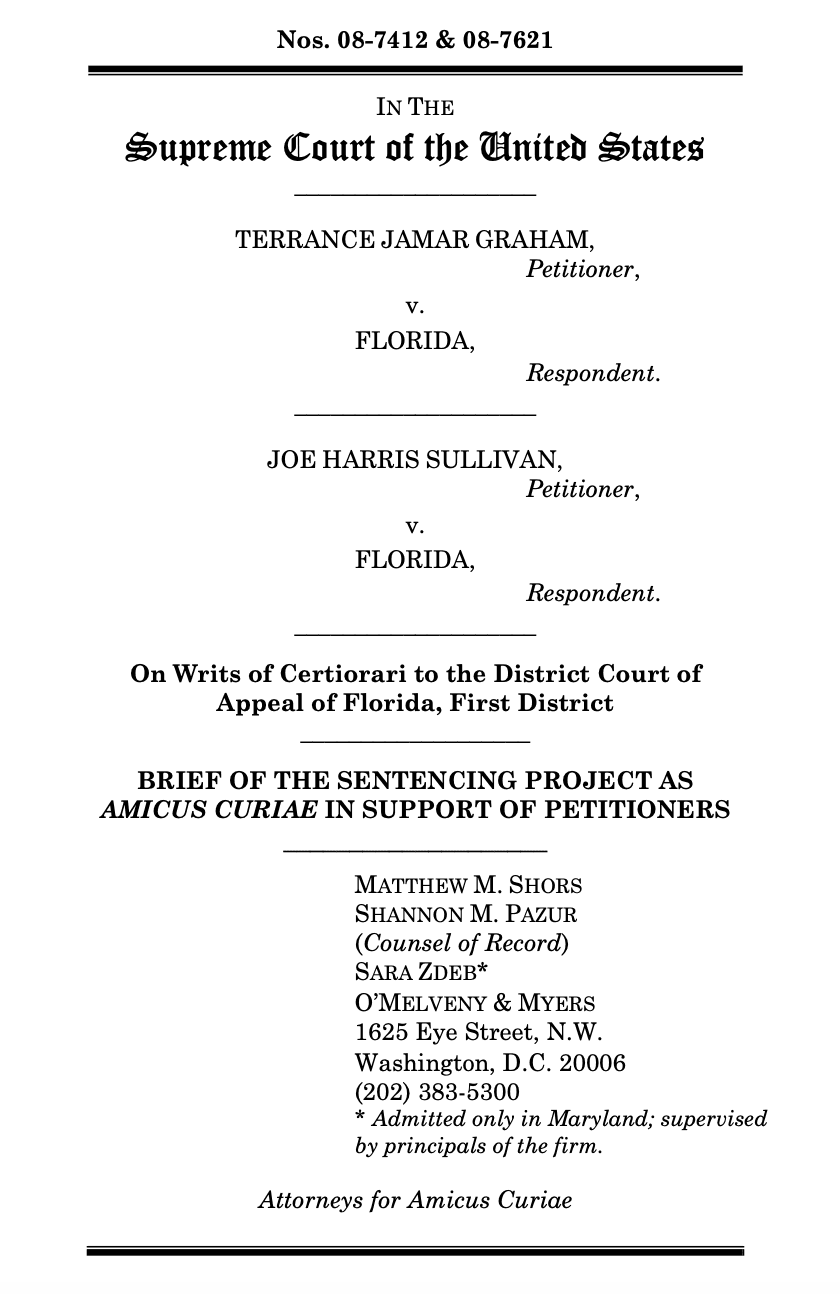
Summary of Argument
In Florida and other states, juveniles – sometimes as young as 13 or 14 at the time of their offense – are serving life sentences without the possibility of parole. In some cases, they are serving these sentences for offenses in which no homicide was committed, or in cases in which they acted as an accomplice for an older, more culpable defendant’s crime. And in many cases, juveniles are serving life without-parole sentences that are effectively mandatory, rather than the result of careful and individualized sentencing decisions. State law frequently requires both that these juvenile offenders be tried as adults and that, upon conviction, they be sentenced to life without parole, meaning that no judge or jury ever considered whether the juvenile’s age of culpability potentially warranted a lesser sentence.
These sentences violate the Eighth Amendment’s prohibition on cruel and unusual punishment. The Eighth Amendment is grounded in the “basic precept of justice that punishment for crime should be graduated and proportioned to the offense.” Roper v. Simmons, 543 U.S. 551, 560 (2005) (citations and quotation marks omitted). Whether a particular penalty comports with this proportionality requirement depends in large part on the culpability of the offender – a factor that has motivated this Court’s rejection of disproportionate penalties in a variety of circumstances. See, e.g., Roper, 543 U.S. at 569-70; Atkins v. Virginia, 536 U.S. 304, 319 (2002); En mund v. Florida, 458 U.S. 782, 797-801 (1982).
Nowhere is the question of a defendant’s culpability more relevant than in sentences involving juvenile offenders, whom this Court has long recognized are less blameworthy than adults who commit similar crimes. See, e.g., Thompson v. Oklahoma, 487 U.S. 815, 835 (1988) (“less culpability should attach to a crime committed by a juvenile than to a comparable crime committed by an adult”) (plurality op.). In particular, juveniles lack the same maturity as adults, are more susceptible to negative influences, and possess a greater capacity for reform over time. Roper, 543 U.S. at 569-70. This Court has determined that because of these “marked and well understood” differences between juveniles and adults, id. at 572-73, the Eighth Amendment prohibits imposition of the death penalty on offenders under the age of 18, id. at 578.
That same reasoning applies with equal force to sentences of life without parole for juvenile offenders. Life without parole, “like death, is a sentence different in quality and character from a sentence to a term of years subject to parole,” Hampton v. Kentucky, 666 S.W.2d 737, 741 (Ky. 1984) – and its imposition runs counter to this Court’s conclusion that juveniles cannot be classified “among the worst offenders,” Roper, 543 U.S. at 570. Indeed, life without parole not only condemns juveniles to a sentence that reflects a determination that they can never be rehabilitated, it removes incentives for good behavior by making it effectively impossible in many cases for juveniles to access rehabilitative services that are in practice reserved for offenders with lesser sentences.
It is no answer to the Eighth Amendment problem to say that individual judges and juries are in the best position to make case-by-case decisions about which juvenile offenders deserve a life without-parole sentence. Unlike the sentence this Court considered in Roper, life without parole is often imposed on juveniles without any individualized consideration of their diminished culpability. Before Roper’s categorical ban on the sentence, the death penalty could only be imposed on a juvenile after a judge or jury considered his culpability. See Roper, 543 U.S. at 602-03 (O’Connor, J., dissenting). In the context of life without parole, however, such individualized consideration is frequently unavailable or even impossible. Mandatory transfer and mandatory sentencing laws, whose use has expanded dramatically over the past two decades, create a perfect storm for juvenile offenders: They require that juveniles be tried in the adult system and, upon conviction, mandate a sentence of life without parole. Together, these laws deny many juveniles any opportunity to have their age, home environment, history of abuse, and other factors related to their culpability considered at any stage of the proceedings against them.
For these reasons, the Eighth Amendment prohibits the imposition of life without parole on juvenile offenders. The judgments below should be reversed.